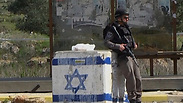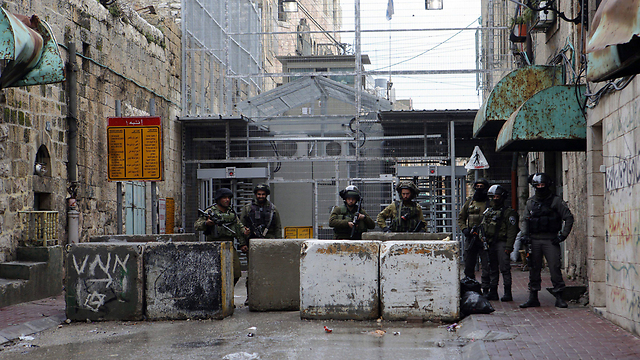
IDF worried of resumption of terror attacks over holidays
Senior IDF officer says army deploying more troops to hot spots in the West Bank ahead of Passover, Independence Day and Ramadan.
Despite the significant drop in terror attacks over the past month, the IDF is worried that the upcoming holidays - Passover, Independence Day and Ramadan - will serve to reignite the violence in the West Bank, East Jerusalem and particularly on the Temple Mount.
"We're preparing for a significant escalation during the holidays, and we're increasing the amount of troops on the ground to about two more battalions, in addition to the four existing reinforcement battalions," said a senior officer in the military's Judea and Samaria Division.
"The holiday period will be the real test for the current situation, with Israelis going out on trips during their time off. We're identifying more and more alerts of possible threats ahead of the holidays," he added.
The senior official attributed the relative quiet to extensive operations on the ground to thwart lone wolf terrorism, among other things by mapping the six main areas in the West Bank in which most attacks took place and allocating 40 percent of the forces to these areas.
He noted that since October, Israeli security forces have thwarted 10 attempted kidnappings. In addition, IDF troops demolished or sealed off 13 homes of terrorists.
In a briefing with reporters on Tuesday, Defense Minister Moshe Ya’alon said the fact most attacks end with the terrorist being killed serves as a deterring factor to other would-be assailants. In addition, he said the defense establishment has gotten better at identifying would-be attackers on social media and stopping them before they could commit an attack.
Unlike the prime minster, Ya’alon gives the Palestinian security forces some credit for the reduction of the number of attacks. “Families of young people who suspected that they were planning attacks alerted the (Palestinian security) services,” he said. “There were more than a few cases in which families turned in youths who were about to commit an attack, and even after one (had been committed).” He added that the Palestinian security services are also working against lone-wolf attackers on the ground, searching for knives in Palestinian students' bags.
Palestinian security services have claimed that the IDF's entering Area A damaged their street-level position and made them appear to be collaborators with Israel. Ya'alon said that the more Palestinian security services do to fight terrorism on the ground, the less the IDF will have to operate in Area A for this purpose.
However, he emphasized, "There is no way that we will completely forswear entering Area A, which we are permitted to do under the Oslo Accords, because of our bitter experience."
On the southern border, the defense minister warned that, despite IDF success in reducing the number of rocket barrages from Gaza over the past year and a half and Egypt's intercepting contraband entering the Strip, Hamas has still been gaining strength.
Ya’alon explained that Hamas was searching for ways to increase its operationality on land, air and sea. The IDF managed to strike Hamas’s “drone base” during the 2014 Operation Protective Edge, but the defense minister noted that the Gaza-based terror group is still developing unmanned aircraft, funded and aided by Iran.
Hamas is also focusing on improving its naval capabilities, with which they could threaten Israel. Ya’alon said he was still opposed to the establishment of a naval port in Gaza—an initiative promoted by his fellow Likud member, Minister of Transportation, Intelligence, and Atomic Energy Yisrael Katz.
Ya'alon also asserted that there is no blockade of Gaza, but rather a security-based closure, which consists of Israel preventing the import of materials that could be used to manufacture rockets.
Another strategic issue on the agenda was the US military aid agreement, the outcome of which is uncertain. The negotiations with the Americans are stalled at this stage, while the gaps between Israeli demands and American willingness are still vast. "We haven't reached an agreement with the Americans," Ya'alon admitted.












